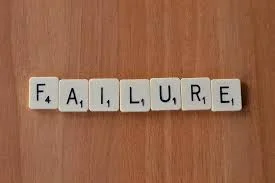Failure. Nobody wants to talk about it, but I had to.
Before applying to Steve Reifenberg’s International Development and Design Thinking course, I had no idea what to expect. In fact, I was scared of being rejected from this class. Admittedly, I was scared of failing before even getting the opportunity to fail. Still, I knew that I wanted to apply because the risk of rejection was outweighed by the intriguing opportunity for the collaborative learning that the class offered.
One of the collaborative learning opportunities that I was assigned to this semester was to prepare and teach a class on failure with two other students. I had a difficult time with this assignment. I constantly found myself frustrated throughout the preparation process. I didn’t really understand why I found myself being overcome by these emotions, but looking back now, I realized that I was being crippled by the fear of failure:
Scared that the readings we picked for the class discussion would not resonate with our classmates and that the class discussion would not be fulfilling.
Scared that our presentation would not flow smoothly and would not be timely.
Scared that people would be hesitant in completing the assignment we assigned them: completing a failure resume- a resume that consists of academic failures, personal failures, relationship failures, etc. Nobody wants to write out their failures so I figured we would receive some negative reactions towards this assignment.
Scared that we would not be able to execute our planned activity well: having each Development Advisory Teams (DAT) proptype or think of ways that their team could fail in achieving their end goals.
I had to address these thoughts and fears before being able to teach our class. By acknowledging these fears, I was set free from them. I came to a peaceful state of knowing that whatever happens will happen and that these outcomes are great learning opportunities.
Furthermore, another fear that I was able to address with my DAT group during our class discussion was the fear of failing in our DAT project. My DAT team has been tasked with the opportunity to collaborate with Notre Dame International in establishing and expanding Notre Dame’s presence in India as a part of the Asia Initiatives. For this project, we decided to focus on mapping the range of faculty, staff, students, and alumni engagements in India (we called this “relationship mapping”) and exploring the different possibilities in creating a more robust set of partnerships in India (we called this “vision mapping”). This task sometimes feels so big and daunting that often I feel as if my team (myself included) is stuck. Stuck in the fact that we’re not administrators making Notre Dame’s final decision. Stuck in the fear that our relationship and vision mappings won’t be useful for our clients. Stuck in the fact that we don’t feel a sense of urgency in meeting with faculty involved in India or in creating our final deliverable.
These feelings of failure and hesitation came to light when we were tasked with prototyping failure, or envisioning the ways our final presentation could go wrong, in our DAT. We discussed how we fear the deliverables we present will look great, but will not be sustainable:
For the relationship mapping, we created a webpage mock-up that highlights faculty, students, programs, etc. Although we believed that this idea could be useful in bringing to light Notre Dame’s connections in India, we worried that the website manager for NDI would not be able to keep the webpage updated.
For the vision mapping, we dreamed big in terms of the programs that we could suggest that students would find interesting, but I think we often got stumped on the question: how big is too big? The fact that we’re not administrators definitely hindered our progress in thinking of these opportunities, but realized that our role as students is just as important. These administrators create programs that serve the students interests and values.
I am still unclear as to how our deliverable will come together, it was liberating to be able to address these and move forward with the final push.
I am grateful that I took the chance in applying for this class. The valuable lessons that I have learned through teaching the class on failure, participating in the classes led by other co-creators, and hearing from Prof. Reifenberg’s experiences are lessons that I will take when I enter the field of human-centered development. Ana-Dionne Lanier, my mentor for this class, recently told me that everything in life is all about “taking steps towards an end goal.” My end goal is to create human-centered solutions and these solutions are best learned with empathy, but cannot be learned without transcending the fear of failure. This class has provided me with the skills and knowledge to work towards this end goal.

